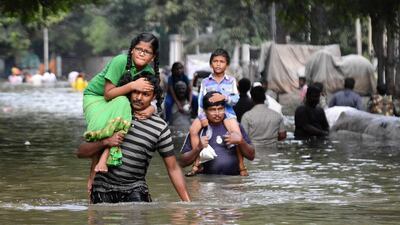CHENNAI // A week after the torrential rains abated, my parents and I flew to Chennai, where they live.
They had visited me in New Delhi during the worst of the flooding caused by the rain, sparing me considerable worry for their safety.
But we returned on Saturday, concerned about the state of our apartment and of our city.
At least 340 people have been confirmed dead in the floods that swept through Chennai and its neighbouring coastal areas in the first three days of December. According to Aon Blenfield, a British reinsurance broker, the floods caused US$3 billion (Dh11bn) in economic damages.
From Delhi, we had watched on television as water swamped the bridge near our house in Saidapet, an area in south Chennai. On Twitter, I read pleas for help and relief from Srinagar Colony, where our apartment building stands.
In the rare instances that we could reach our neighbours by phone from Delhi, they described the situation: no electricity for days, the water rising so high in the compound of our building that it submerged parked cars, no groceries or fresh food, spotty communications.
The situation was alarming. Our apartment is on the third floor, so while it was safe from flooding, we wondered if rain had come in through a half-open window or door. We also feared for the safety of people we knew. We had relatives and friends in the worst-hit areas; my grandmother, nearly 90 years old and living with my aunt, is in reasonable health. But if a medical emergency had occurred, it would have been impossible to reach a hospital.
From the air, as our plane circled above the city, we could see areas that remained waterlogged. The pools of water were deep black, indicating that sewage had mixed in; the water lapped almost a metre high in some places.
However, the road from the airport to our colony was clean and dry. It is a motorway that leads north from Chennai, and it must have been a priority for city authorities. Neat but massive mounds of rubbish sat by the roadside, awaiting collection.
Near our apartment building, one small street still had standing water, black and filthy, unable to flow away because the drains were blocked or full. Our compound was dry now, but our car was wrecked. The flood water had risen to roof level and trickled into the interiors to drench the seats, and under the hood to ruin the engine.
My father called our garage, eight kilometres away, to see if they could send someone to pick up the car.
“Everybody is calling us,” the receptionist said. “We don’t have enough men to go pick up all the cars that need to be fixed.” So we hired a tow-truck, for 3,000 rupees (Dh164), to take our car to the garage and add it to the crowd of vehicles awaiting repair.
Inside our apartment, we were luckier. No water had entered, and although we still go without power for eight or 10 hours every day, our telephone and the internet work. Our family is safe, as are our close friends.
But we know also that our good fortune is a result of our relative privilege. The newspapers are still full of reports about the stagnant water in low-income neighbourhoods, about families who have lost vital documents, and about the prohibitive costs of rebuilding homes.
Corpses continue to turn up, and people continue to die even though the rains are now over. On Sunday, The Hindu reported the tragic death of a 17-year-old named J Imran, who had volunteered in relief efforts during the floods and fallen grievously ill.
R Sunder, a freelance graphic designer who organised volunteers to deliver food packets during the rains, said many areas of the city remain in critical condition.
“The water and the trash are beginning to stink. There are health hazards, particularly if no clean drinking water is available,” Mr Sunder said.
“And while the attention during and just after the floods ensured that many people got help, the danger now is that attention has shifted elsewhere, and the momentum is slowing down.”
Mr Sunder himself had to return to work towards the middle of last week, having spent many days on his volunteering efforts. “But I’m still in touch with people who need help, and I’m trying to direct them to the relevant authorities,” he said. “I hope they get the assistance they need.”
Shyama Swaminathan, a doctor in a Chennai hospital, said that waterborne diseases typically appeared after a few weeks lag.
“As of now, we aren’t seeing too many people coming in with symptoms of cholera or leptospirosis or typhoid,” she said. “But it’s still early. If these diseases show themselves, it will be after some time, so this is the wrong moment for the city to let its guard down.”
ssubramanian@thenational.ae

